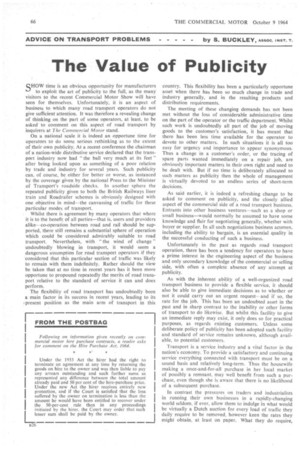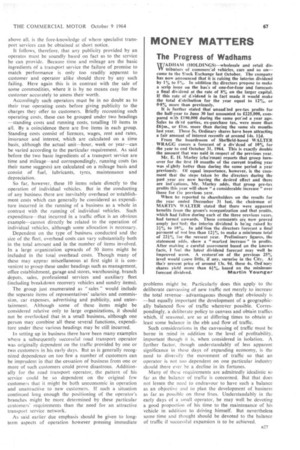The Value of Publicity
Page 68

Page 69

If you've noticed an error in this article please click here to report it so we can fix it.
ADVICE ON TRANSPORT PROBLEMS by S. BUCKLEY, ASSOC. I NST. T.
3How time is an obvious opportunity for manufacturers to exploit the art of publicity to the full, as the many. visitors to the recent Commercial Motor Show will have seen for themselves. Unfortunately, it is an aspect of business to which many road transport operators do not give sufficient attention. It was therefore a revealing change of thinking on the part of some operators, at least, to be asked to comment on this aspect of road transport by inquirers at Vie Commercial Motor stand.
On a national scale it is indeed an opportune time for operators to do some serious rethinking as to the extent of their own publicity. At a recent conference the chairman of a nation-wide distributive service declared that the transport industry now had "the ball very much at its feet" after being looked upon as something of a poor relation by trade and industry for several years. Such publicity can, of course, be either for better or worse, as instanced by the coverage given by the national Press to the Minister of Transport's roadside checks. In another sphere the repeated publicity given to both the British Railways liner train and Roadrailer schemes is obviously designed with one objective in mind—the canvassing of traffic for these particular modes of transport.
Whilst there is agreement by many operators that where it is to the benefit of all parties—that is, users and providers alike—co-operation between road and rail should be supported, there still remains a substantial sphere of operation which could be considered admirably suitable to road transport. Nevertheless, with "the wind of change" undoubtedly blowing in transport, it would seem a dangerous assumption for road transport operators if they -considered that this particular section of traffic was likely to remain with them indefinitely. Rather should the view be taken that at no time in recent years has it been more opportune to propound repeatedly the merits of road transport relative to the standard of service it can and does perform.
The flexibility of road transport has undoubtedly been a main factor in its success in recent years, leading to its ?present position as the main arm of transport in this country. This flexibility has been a particularly opportune asset when there has been so much change in trade and industry generally, and in the resulting products and distribution requirements.
The meeting of these changing demands has not been met without the loss of considerable administrative time on the part of the operator or the traffic department. Whilst such work is undoubtedly all part of the job of moving goods to the customer's satisfaction, it has meant that there has been less time available for the operator to devote to other matters. In such situations it is all too easy for urgency and importance to appear synonymous.. Thus a change in a customer's order, or the tracing of spare parts wanted immediately on a repair job, are obviously important matters in their own right and need to be dealt with. But if no time is deliberately allocated to such matters as publicity then the whole of management is virtually devoted to an endless series of short-term decisions.
As said earlier, it is indeed a refreshing change to be asked to comment on publicity, and the closely allied aspect of the commercial side of a road transport business. Entrants into other business ventures—such as a shop or small business—would normally be assumed to have some knowledge and flair for negotiating generally, whether with buyer or supplier. In all such negotiations business acumen, including the ability to bargain, is an essential quality in the successful conducting of such a business.
Unfortunately in the past as regards road transport operation, there has been a tendency for operators to have a prime interest in the engineering aspect of the business and only secondary knowledge of the commercial or selling side, with often a complete absence of any attempt at publicity.
As with the inherent ability of a well-organized road transport business to provide a flexible service, it should also be able to give immediate decisions as to whether or not it could carry out an urgent request—and if so, the rate for the job. This has been an undoubted asset in the past and in sharp contrast to the inability or other forms of transport to do likewise. But whilst this facility to give an immediate reply may exist, it only does so for practical purposes, as regards existing customers. Unless some deliberate policy of publicity has been adopted such facility and standard of service remains unknown, although available, to potential customers.
Transport is a service industry and a vital factor in the nation's economy. To provide a satisfactory and continuing service everything connected with transport must be on a sound basis and relatively long-term. Thus the housewife making a once-and-for-all purchase in her focal market of possibly a remnant, may well benefit from such a purchase, even though she is aware that there is no likelihood of a subsequent purchase.
In contrast the pressures on traders and industrialists in running their own businesses in a rapidly-changing world seldom, if ever, allow them to indulge in what would be virtually a Dutch auction for every load of traffic they daily require to be removed, however keen the rates they might obtain, at least on paper. What they do require, above all. is the fore-knowledge of where specialist transport services can be obtained at short notice.
It follows, therefore, that any publicity provided by an operatoi must be soundly based on fact as to the service he can provide. Because time and mileage are the basic ingredients of a transport service the failure of promise to match performance is only too readily apparent to customer and operator alike should there by any such failing. Here again this is in contrast with the sale of some commodities, where it is by no means easy for the customer accurately to assess their worth.
Accordingly such operators must be in no doubt as to their true operating costs before giving publicity to the charges they offer to customers. Briefly recounting such operating costs, these can be grouped under two headings —standing costs and running costs, totalling 10 items in all. By a coincidence there are five items in each group. Standing costs consist of licences, wages, rent and rates, insurance and interest, which are calculated on a time basis, although the actual unit—hour, week or year—can be varied according to the particular requirement. As said before the two basic ingredients of a transport service are time and mileage—and correspondingly, running costs (as their name suggests) are calculated on a mileage basis and consist of fuel, lubricants, tyres, maintenance and depreciation.
So far, however, these 10 items relate directly to the operation of individual vehicles. But in the conducting of any business there are inevitably overhead or 'establishment costs which can generally be considered as expenditure incurred in the running of a business as a whole in contrast with the running of individual vehicles. Such expenditure—that incurred in a traffic office is an obvious example—cannot directly be related to the operation of individual vehicles, although some allocation is necessary.
Dependent on the type of business conducted and the size of the fleet, overhead costs can vary substantially both in the total amount and in the number of items involved. In a large organization upwards of 50 items might be included in the total overhead costs. Though many of these may appear miscellaneous at first sight it is convenient to group these under headings such as management, office establishment, garage and stores, warehousing, branch depots, sales, professional services and auxiliary fleet (including breakdown recovery vehicles and sundry items).
The group just enumerated as " sales " would include the separate items of representatives' salaries and commission, car expenses, advertising and publicity, and entertainment. Although some of these items might be considered relative only to large organizations, it should not be overlooked that in a small business, although one person may combine all these several functions, expenditure under these various headings may be still incurred.
In setting up in business there have been many examples where a subsequently successful road transport operator was originally dependent on the traffic provided by one or two custOmers in his early days. But as is generally recognized dependence on too few a number of customers can be imprudent in that the cessation of business from one or more of such customers could prove disastrous. Additionally for the road transport operator, the pattern of his service could be so dependent on the original few customers that it might be both uneconomic in operation and unattractive to new customers. If such a situation continued long enough the positioning of the operator's branches might be more determined by these particular customers requirements than the need for an attractive transport service network.
As said earlier due emphasis should be given to longterm aspects of operation however pressing immediate
problems might be. Particularly does this apply to the deliberate canvassing of new traffic not merely to increase the total revenue—advantageous though that obviously is —but equally important the development of a geographically balanced flow of traffic whereVer possible. Correspondingly, a deliberate policy to canvass and obtain traffics which, if seasonal, are so at differing times to obtain at
least some balance in the ebb and flow of traffic.
Such considerations in the canvassing of traffic must be borne in mind in addition to the level of profitability, important though it is, when considered in isolation. A further factor, though understandably of less apparent significance in these days of expanding economy, is the need to diversify the movement of traffic so that an operator is not too dependent on one particular industry should there ever be a decline in its fortunes.
Many of these requirements are admittedly idealistic so far as the balance of traffic is concerned. But that does not lessen the need to endeavour to have such a balance as an objective and to plan the development of business as far as possible on these lines. Understandably in the early days of a small operator, he may well be devoting a good proportion of his time to the maintenance of his vehicle in addition to driving himself. But nevertheless some time and thought should be devoted to the balance of traffic if successful expansion is to be achieved.












































































































